South Sudan's men of dishonour
- Published
"They took away the cattle and the livestock, and the girls who were over 15 to make their wives. They killed the others" - South Sudanese civilian
The rules of war were broken long ago in South Sudan, but the recent spate of violence against civilians has introduced a new level of barbarity.
Both government and rebel troops have been accused of atrocities in 21 months of war, but in the past few months the accounts from those who escaped the violence are horrifying.
They tell of women and girls being raped or abducted, families being burned alive in their homes - and at least one case of a child being hanged from a tree.
The abandoned farms and fields, the torched huts, and the complete lack of cattle in Leer, Unity State, are evidence of what appears to have been a scorched earth policy of destruction.
Leer is the hometown of rebel leader Reik Machar and was a stronghold for the military forces that backed him when the army split.
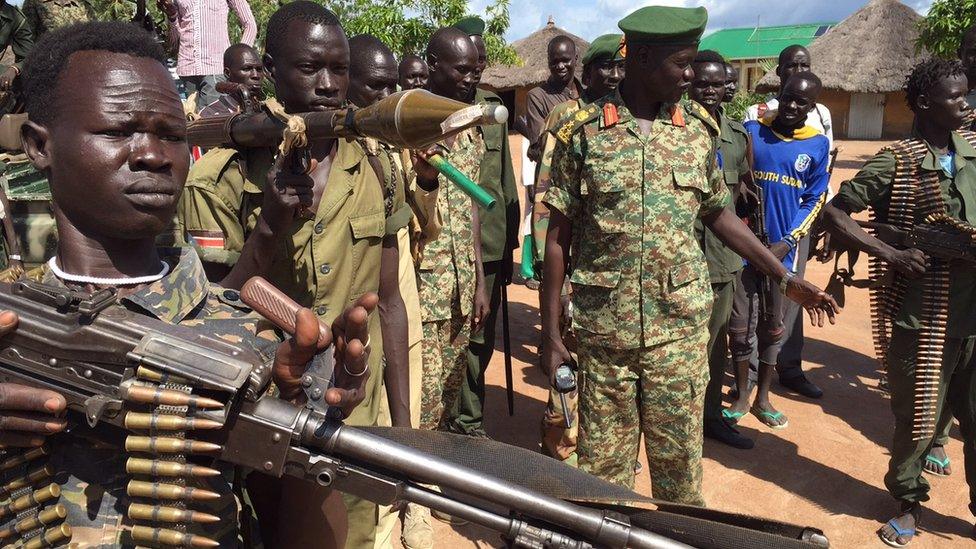
Nyal, in Unity State, is one of the last remaining areas held by rebel forces
Now it is virtually empty, as tens of thousands of people have scattered into the marshes of the Nile flood plains and into an overcrowded United Nations camp.
The destruction is evident from the air - access on the ground for journalists has been limited.
The story of what happened has to be pieced together from the accounts of those forced from their homes, and it is testimony to a terrifying campaign of violence.
"They spared no-one, neither a child, an old man nor an old woman," Nyakuoth Manyal told me as she sat under a small, home-made shelter of wooden sticks and tarpaulin.
"They killed everyone. There was no-one left in the village," she said, as some of the children she had brought to the UN camp in Bentiu lay next to her listening.
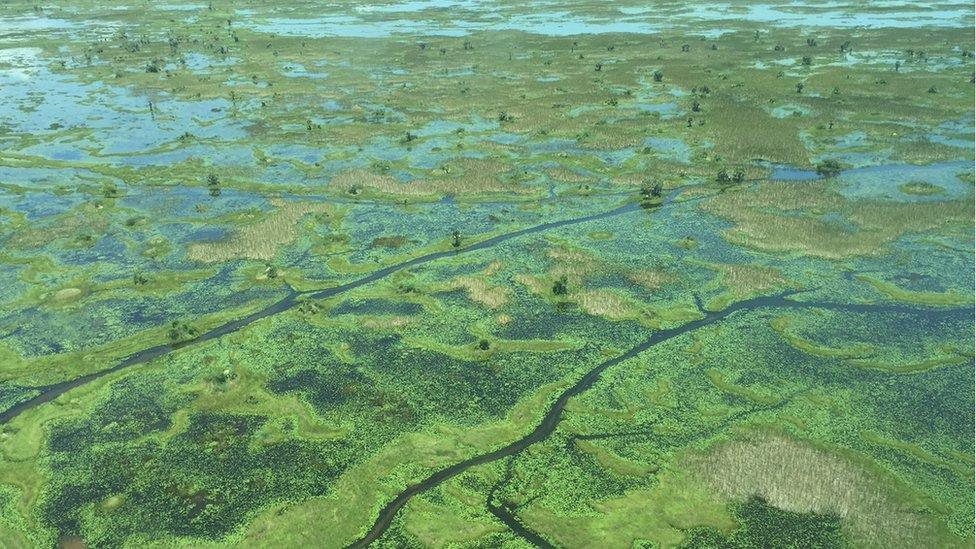
Tens of thousands are marooned in the marshes, where they have fled to escape the fighting
They had spent weeks living under a tree, but a shortage of food forced them to walk for days to the UN camp they had heard about.
"They took away the cattle, and girls over 15 to make their wives. It was some Dinka and some Nuer who did it."
These are the two biggest ethnic groups in South Sudan, represented by the political foes who sparked this civil war: President Salva Kiir who is Dinka, and former vice-president turned rebel leader Riek Machar who is Nuer.

South Sudan: Find out more
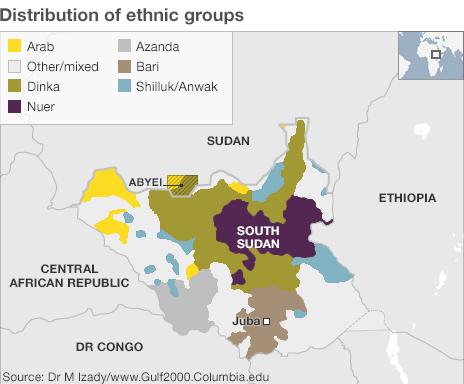
There is no dominant culture in South Sudan - the Dinka and the Nuer are the largest of more than 60 ethnic groups, each with its own language and traditional beliefs, alongside Christianity and Islam

In December 2013, violent clashes in the capital Juba soon spread across the country, sparking division in the army largely along ethnic lines, with the majority of rebel forces being Nuer.
The government says it was an attempted coup, the rebels say it was a politically motivated attack on a rival political group.
There's no independent clarification of what sparked the fighting, but there's no doubt millions have been displaced and millions more are suffering sickness and hunger.
An ineffective ceasefire and an internationally brokered peace agreement flawed by reservations and objections is doing little to resolve the crisis.
The evidence from Unity State suggests society is unravelling and with it the chances of peace and stability returning any time soon to the world's youngest country.
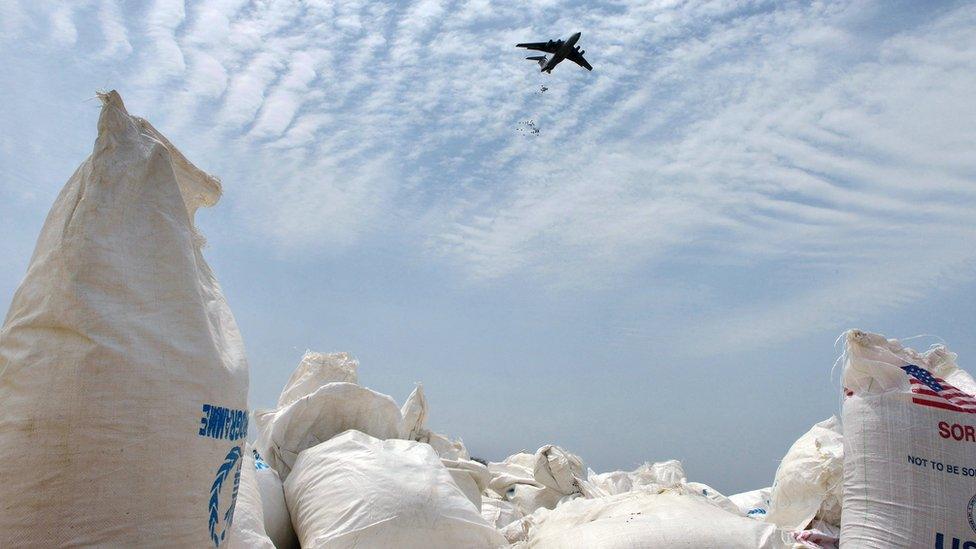
People in inaccessible areas have to rely on food drops to survive
Nyaguar Nhial said she and her family fled the fighting into the marshes, spending their days up to their necks in water with the children floating on reed mats.
"Still the soldiers would be firing into the water," she said, describing how they would wait until after dark before going venturing out onto high ground to sleep and then slipping back into the water before first light.
They spent two months living like this before hunger took its toll and they came to the camp for help.
"On the first day the soldiers arrived in the village they shot at everyone, sparing nobody," said another woman, breast-feeding next to her, and who did not want to give her name.
"They didn't even spare the girls - raping them, forcefully, so there was nothing they could do."
They said some of the attackers were wearing military uniforms, others not, and repeated the claim this was not just Dinka killing Nuer, but this was becoming an intra-ethnic conflict of Nuer killing Nuer.
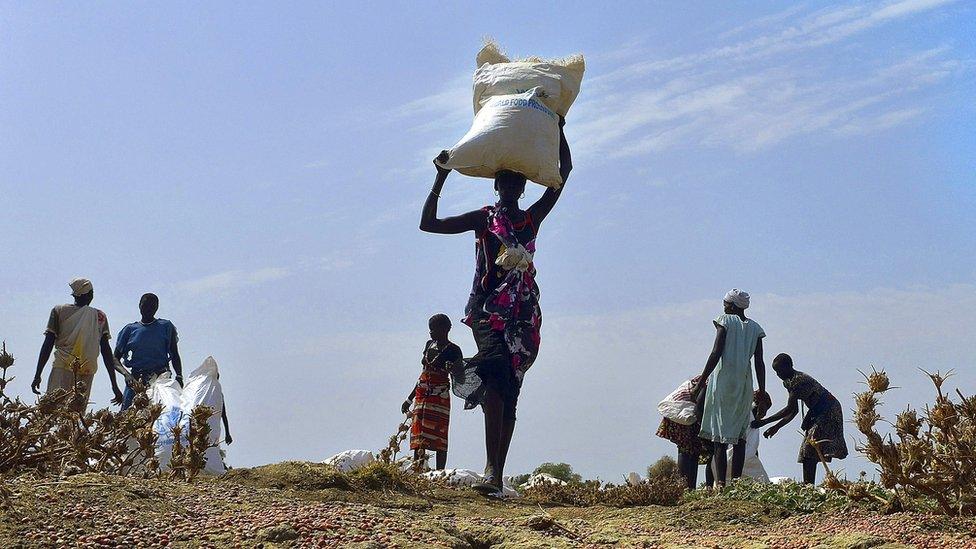
The WFP says there is a serious risk of famine in South Sudan if humanitarian access is not improved
Ethnic violence is rarely clear-cut, and the Bul-Nuer clan, and their armed youth militia, have been blamed for joining government troops on an offensive into the rebel stronghold in Unity State.
South Sudan has cattle-rustling culture and their reward appears to have been the cattle, now absent from Leer, but present in large numbers in Bul-Nuer territory.
While violence is not unusual, well-defined lines have now been well and truly crossed, and traditionally safe places for women and children to shelter have been obliterated by the war.
"Their coping mechanisms have not helped them this time around," said David Littlejohn-Carillo, who leads the International Committee of the Red Cross mission in Unity State.
"It's a deadly overlap: continued fighting fuelled by local rivalry, a political split on the national level with a large amount of weapons and ammunition, and the weather factor."
There is usually a lull in fighting during the rainy season where differences are settled, but there has been less rain this year which is bad for both crops and peace-making.
Clans that were once allies are now turning on each other, as accountability appears to count for little - and levels of society from politician to pastoralist are disintegrating.
Every recent arrival at the Bentiu UN camp has a terrible story to tell - that is why they have come.
That is also why the camp has tripled in size in a few months and is now dangerously overcrowded with an epidemic of malaria and children dying of malnutrition.
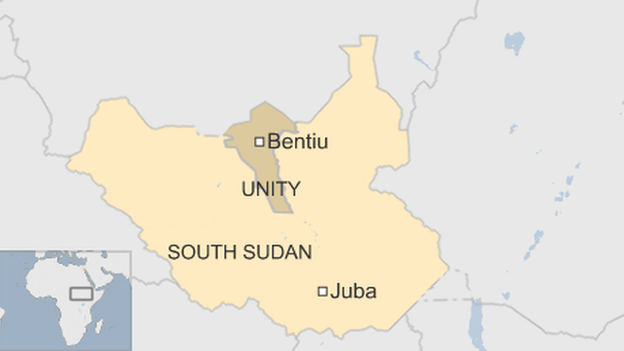
A South Sudanese woman working for Unicef, the United Nations children's fund, who didn't want to be named, has been collecting testimony from some of those arriving at the camp.
What she found echoes the events described in reports by the UN, Human Rights Watch, and a leaked Africa Union report into atrocities.
"There were many children killed. They witnessed many women killed and they saw with their own eyes, in the areas where they lived, many girls and women raped, and some abducted - they took them with the cattle," she said.
"According to the testimony of one family they saw four children killed - three shot by guns and one not killed in a normal way, but hanged until the child died."
The presidential spokesman for South Sudan, Ateny Wek Ateny, denied government troops had carried out atrocities but said an investigation was going on.
"We will not leave any stone unturned and we will bring those people to the books," he said, if there is evidence atrocities were carried out.
"It is atrocities committed by South Sudanese against South Sudanese, so they are in the jurisdiction of our laws."